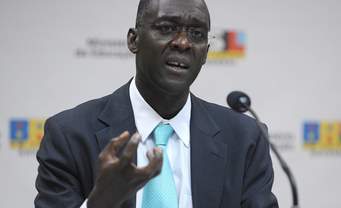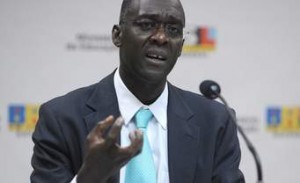Exactly 10:04pm West African Time (WAT) on Tuesday 3rd May 2016 I got a shared email containing the summary note of the meeting with African Civil Society Organizations with the World Bank Vice President for Africa Makhtar Diop that took place on Thursday, April 14, 2016 on the margin of World Bank/IMF Spring Meetings in Washington, DC. It was same day that my article was published in the morning by Daily Trust Newspaper titled ‘Engaging World Bank VP for Africa on Health Matters’ and same day it was posted in Health Reporters newspaper.
Let me quickly make a clarification that sharing the note by the Vice President’s team to the attendees was part of the agreed next steps discussed in the meeting and I want to believe that the timing of sharing the note same day about 12 hours after my article was published was a co-incidence, however having said that I was happy we got a response that highlighted some of the next steps to embark upon.
As I mentioned in my article “Mr. Makhtar Diop met us on Thursday, April 14th 2016 from 7:30 p.m at the J Building of the World Bank. With him were many of the senior officials of the African team and many country directors of World Bank.”
My question then to him was about the “how” in achieving these 3 items. I mentioned among others that “for example how would he support CSOs to monitor implementation of World Bank Programmes and how would he support them to have voice?”
I concluded my article by using the Global Financing Facility in support of Every Woman Every Child as a case study on what the Vice President could do improve CSOs’ voice and support monitoring of World Bank Programmes.
Let’s come back to the meeting notes shared with attendees. “He cited three areas in which he would like to partner with CSOs:
- Social Inclusion – To address the needs of Albinos, street children, teenage mothers, the handicapped (due to polio or other diseases);
- Monitoring of Bank operations for development effectiveness – by partnering with CSOs to enhance accountability; and
- Voice – to afford a greater voice to African CSOs, rather than relying heavily on large international CSOs speaking “in the name of” Africa on development issues.”
From the meeting note the bank’s response to the issues raised centered on five actions. I will list them and raise question for each one.
- “The Bank will explore the possibility of including CSOs in the IFC’s Development Marketplace The Bank is also looking at initiating partnerships with academic institutions such as George Washington University’s Business School to link African alumni to developments on the continent, including twinning opportunities with CSOs and development think tanks.” This is a welcome development but it needs clarity and further brainstorming. For example partnering with academic institutions such as George Washington University’s Business School is an innovative idea but it should not be only restricted to linking African alumni to development, but rather World Bank could partner with the institution to design new capacity trainings tailored at empowering African CSOs in advocacy, diplomacy and budget tracking. In doing that the VP office could improve the voices of the CSOs in Africa.
- “The Bank can use its citizen engagement tool to promote structured dialogue with CSOs and Governments at the country level.” This is also another good innovation. It is important to define how the dialogue between CSOs and Governments could be better coordinated in the spirit of improving accountability and transparency.
- “Promote development debate with CSOs in country offices – Country Directors will promote this in their respective country management units.” Achieving this will require more discussion between the VP office and the World Bank Country Directors. This is because in many African countries apart from the usual press releases being shared by the country offices, there is some level of skepticism to provide detail information regarding programmes.
- “Encourage CSOs to participate in monitoring Bank projects –Country Directors to promote this in their country management units.” My comments above also serves this action point. We hope to see a proactive plans by the country offices on this.
- “Following this meeting, develop concrete plans on how to implement the actions” We look forward to see the timelines and action plans for the implementation.
While the African continent is enmesh with low capacity for increased domestic finances, lack of political will, ravaging poverty, spread of infectious diseases and non-communication diseases, weak health systems to respond to emergencies, we hope this conversation and the planned actions if and when implemented will contribute to reverse some of these negative trends.
All comments to Dr Aminu Magashi Garba Coordinator Africa Health Budget Network & Publisher Health Reporters (healthweekly@yahoo.com)



